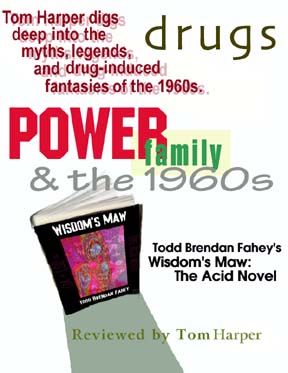
"For unrestricted use the West has permitted only alcohol and tobacco; all other chemical Doors in the Wall are labeled Dope, and their unauthorized takers are Fiends."
--Aldous Huxley, Doors of Perception
| Thus begins Wisdom's Maw. And sets out to explore events transpiring behind some of those restricted doors. Among other things. | |
'To fathom Hell or soar angelic, just take a pinch of psychedelic.'
|
This is the story of Franklin Moore. And Franklin meets some wonderful folks: Allen Ginsberg (though you never see his name), Neal Cassady, Hunter S. Thompson. Swirling around him are President John Kennedy and actress Marilyn Monroe; Jack Ruby and Harvey Oswald; a Chief Justice and a black prostitute; did I mention Jack Kerouac? Aldous Huxley, himself, lives and dies in the story. We are privileged to attend the death of an immortal; near unto the recent public dying of an Acid Priest. Fahey blends reality and drug-induced fantasy, weaving a layered tapestry of themes, laying a mosaic of the tiles, tales and legends of the sixties. On occasion, it is somewhat disconcerting when well-known public figures walk through this work of fiction. But the author handles it in such a natural and unpretentious manner, that it works. And is sometimes hilarious. Though it makes it all the more difficult to discern truth from fantasy, not unlike an acid trip itself. No doubt some 'serious' critics will dismiss the book on this account, and attempt to trivialize its importance. If so, they ignore at their peril a very fine piece of sustained writing, an intricately plotted action adventure novel, and perhaps the first best history of that era yet written. |
As an 'historical' novel, it reminds me somewhat of Robert Graves' I, Claudius. The difference being that Graves wrote his dramatic history about the events of centuries past, while Fahey dramatizes events that he and I lived through, peopled by characters we actually saw or knew, some still walking. But, to a reader in his twenties, and those to come, the sixties are as surely ancient history as the Roman Empire.
The adventure begins with Captain Al Hubbard. He is a prime player in a covert operation to create a superman. 'Better living through chemistry,' as it were. A Captain America, in his own brave new world, and a hero for the new world order. And in the end, a Judas Goat. Captain Hubbard, associate to the powerful, intimate of inner circles, is a living pharmacy, never without his belt-case of glass vials, each full of a tasteless brown liquid, a few hundred miligrams of which will show you the open doors of Heaven, or the depths of Hell. An early meeting of the Captain and his fellow conspirators takes place on board the yacht Wisdom.
The Captain's compatriots are Generals, Admirals, Doctors, and saints (Huxley, perhaps, shadowed by his creations, i.e., George Orwell). All are sinners, except for Huxley and perhaps the Captain; whose hearts are pure. Do we hear F. Scott Fitzgerald?
Damned if there aren't questions raised, such as, is the driven snow pure? Was the original Sandoz acid a dirty brown? Was there a Mosely (Owsley), who turned the dirty brown a fluffy white? Was Dwight Eisenhower really president in the 1950s?
The group's choice for superman is Franklin Moore. Moore is a copper curled, bull-necked, muscular, country boy who is on a creative writing scholarship at Stanford. He's a world champion wrestler, a boy genius, a one-woman man, and soon to be totally spaced on Delysid.
And so we have a politically incorrect protagonist. But in these secretly sanctioned but officially unauthorized experiments with pharmaceuticals, all the characters are devoid of hypocrisy--'to live outside the law, you must be honest' as Dylan said. The men are pagan and sexist. Most of the women are sex objects. Yet, Franklin and his love interest (and 'double' agent) Lorraine are a basically monogamous couple. Suddenly becoming parents of a child not their own, they form and maintain a loving family amid the surrounding chaos. Until drugs transform Moore into 'Grampa,' bald and venerated by a generation of drifters, dopers, slackers, and dharma bums.